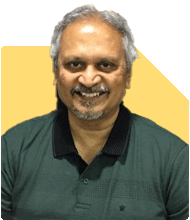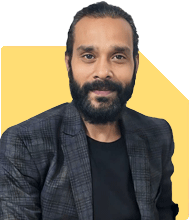Dr Kishore Managoli | Answer |Ask -Follow
NEET-PG, USMLE, NEXT exam expert - Answered on Mar 27, 2023
He is a senior pathologist, scientist, medical educator and entrepreneur with over 30 years of clinical experience and interdisciplinary expertise in medical knowledge management, pharmaceutical research and corporate governance.
He has a master’s degree in pathology from Dr V M Government Medical College, Solapur.... more

Dear sir, my nephew would like to pursue his postgraduation in the US. What do you think would be the right time to appear for Step 1 exam? Does he have the option to choose subjects as well? What is the minimum score to qualify? Kindly advise
You may like to see similar questions and answers below
Sushil Sukhwani | Answer |Ask -Follow
Study Abroad Expert - Answered on Dec 30, 2023
Dr Pananjay K Tiwari | Answer |Ask -Follow
Study Abroad Expert - Answered on Jan 16, 2025
Nayagam P P |10849 Answers |Ask -Follow
Career Counsellor - Answered on Jul 18, 2025
Dr Dipankar Dutta |1837 Answers |Ask -Follow
Tech Careers and Skill Development Expert - Answered on Dec 05, 2025
Dr Shyam Jamalabad |108 Answers |Ask -Follow
Dentist - Answered on Dec 05, 2025
Dr Shyam Jamalabad |108 Answers |Ask -Follow
Dentist - Answered on Dec 05, 2025
Dr Shyam Jamalabad |108 Answers |Ask -Follow
Dentist - Answered on Dec 05, 2025
Dr Dipankar Dutta |1837 Answers |Ask -Follow
Tech Careers and Skill Development Expert - Answered on Dec 05, 2025
Ulhas Joshi |280 Answers |Ask -Follow
Mutual Fund Expert - Answered on Dec 05, 2025
Dr Dipankar Dutta |1837 Answers |Ask -Follow
Tech Careers and Skill Development Expert - Answered on Dec 04, 2025
Ravi Mittal |676 Answers |Ask -Follow
Dating, Relationships Expert - Answered on Dec 04, 2025
Anu Krishna |1745 Answers |Ask -Follow
Relationships Expert, Mind Coach - Answered on Dec 04, 2025
Anu Krishna |1745 Answers |Ask -Follow
Relationships Expert, Mind Coach - Answered on Dec 04, 2025

























